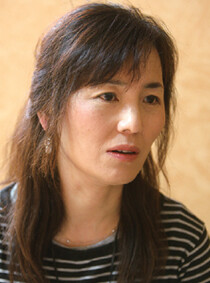hankyoreh
Links to other country sites 다른 나라 사이트 링크
‘The Crucible’ author seeks to turn outrage into action

By Heo Jae-hyun
Gong Ji-young, author of the source novel for the film “The Crucible,” said during an interview with the Hankyoreh on Wednesday, “I wanted to uphold the human rights of students with disabilities who were shoved into trash cans.”
The first encounter with the case at Gwangju’s Inhwa School that inspired Gong to write the novel came from a Hankyoreh report.
“I saw an article in the Hankyoreh,” Gong said. “There was a part where it said that at the moment [the perpetrators] were freed with suspended sentences, the courtroom erupted in a roar from the hearing impaired individuals present. I thought, ‘What could have happened to make them roar like that?’ After I found out about the case, I was aghast.”
Gong said she felt “a sense of calling” after meeting with the student victims.
“It was so hard to see them,” she said. “I made a vow for them. I said I would write a novel that everyone would read to let people know about this incident.”Gong said the box office success of the film adaptation was “completely unexpected.”
“I thought this was a society without the leisure to reflection on the suffering of others,” she said. “But I think things have changed. It seems like the desire that people not be apathetic about others’ misfortune has survived. I think it is a change that arose under the Lee Myung-bak administration, whose policies have greatly increased the number of student dropouts by intensifying competition.”
Both the novel and film present uncomfortably graphic depictions of the sexual abuse suffered by the children. The question of whether these depictions were entirely necessary has been the topic of some debate, but Gong said they were “absolutely necessary.”
“If I left all that out, would people know how ghastly it was? They would only know how terrible the outcome of the trial was if they first knew how terrible the children’s ordeal was.”
Gong said she hoped the film and novel would go beyond popularity and lead to changes in the law. This remark was made in consideration of a proposed amendment to the Social Services Act to strengthen external monitoring of private school foundations, to be operated by Social Welfare Incorporated. The bill, submitted to the National Assembly by the government in 2007, was blocked following objections by the ruling Grand National Party (GNP).
“It is infuriating,” Gong said. “I would like to see the law pushed once again at a time like now when the public is in the right frame of mind. We cannot simply rage like this forever.”
Gong also expressed her displeasure with the media.
“Lately, I have only watched the news on SNS,” she said. “The press has become ruined. If the Gwangju press had investigated the Inhwa School case, the tragedy would never have arrived at this point.”
On the growing anger toward the courts since the film’s premiere, Gong said, “I feel sorry, since it seems like all legal professionals are going to be criticized.”
But she also noted that judges who saw a preview praised it as “a good film to show at the Judicial Research and Training Institute.”
Finally, Gong expressed her hope that the current situation would prompt those in power to “break the cartel of silence toward social injustice and reach an awakening.”
Please direct questions or comments to [englishhani@hani.co.kr]
Editorial・opinion
![[Column] Park Geun-hye déjà vu in Yoon Suk-yeol [Column] Park Geun-hye déjà vu in Yoon Suk-yeol](https://flexible.img.hani.co.kr/flexible/normal/500/300/imgdb/original/2024/0424/651713945113788.jpg) [Column] Park Geun-hye déjà vu in Yoon Suk-yeol
[Column] Park Geun-hye déjà vu in Yoon Suk-yeol![[Editorial] New weight of N. Korea’s nuclear threats makes dialogue all the more urgent [Editorial] New weight of N. Korea’s nuclear threats makes dialogue all the more urgent](https://flexible.img.hani.co.kr/flexible/normal/500/300/imgdb/original/2024/0424/7317139454662664.jpg) [Editorial] New weight of N. Korea’s nuclear threats makes dialogue all the more urgent
[Editorial] New weight of N. Korea’s nuclear threats makes dialogue all the more urgent- [Guest essay] The real reason Korea’s new right wants to dub Rhee a founding father
- [Column] ‘Choson’: Is it time we start referring to N. Korea in its own terms?
- [Editorial] Japan’s rewriting of history with Korea has gone too far
- [Column] The president’s questionable capacity for dialogue
- [Column] Are chaebol firms just pizza pies for families to divvy up as they please?
- [Column] Has Korea, too, crossed the Rubicon on China?
- [Correspondent’s column] In Japan’s alliance with US, echoes of its past alliances with UK
- [Editorial] Does Yoon think the Korean public is wrong?
Most viewed articles
- 1‘We must say no’: Seoul defense chief on Korean, USFK involvement in hypothetical Taiwan crisis
- 2N. Korean delegation’s trip to Iran shows how Pyongyang is leveraging ties with Moscow
- 3‘Weddingflation’ breaks the bank for Korean couples-to-be
- 4[Reportage] On US campuses, student risk arrest as they call for divestment from Israel
- 5Amnesty notes ‘erosion’ of freedom of expression in Korea in annual human rights report
- 6[Column] Park Geun-hye déjà vu in Yoon Suk-yeol
- 7Korea sees more deaths than births for 52nd consecutive month in February
- 8[Editorial] New weight of N. Korea’s nuclear threats makes dialogue all the more urgent
- 9Will NewJeans end up collateral damage in internal feud at K-pop juggernaut Hybe?
- 10[Guest essay] The real reason Korea’s new right wants to dub Rhee a founding father